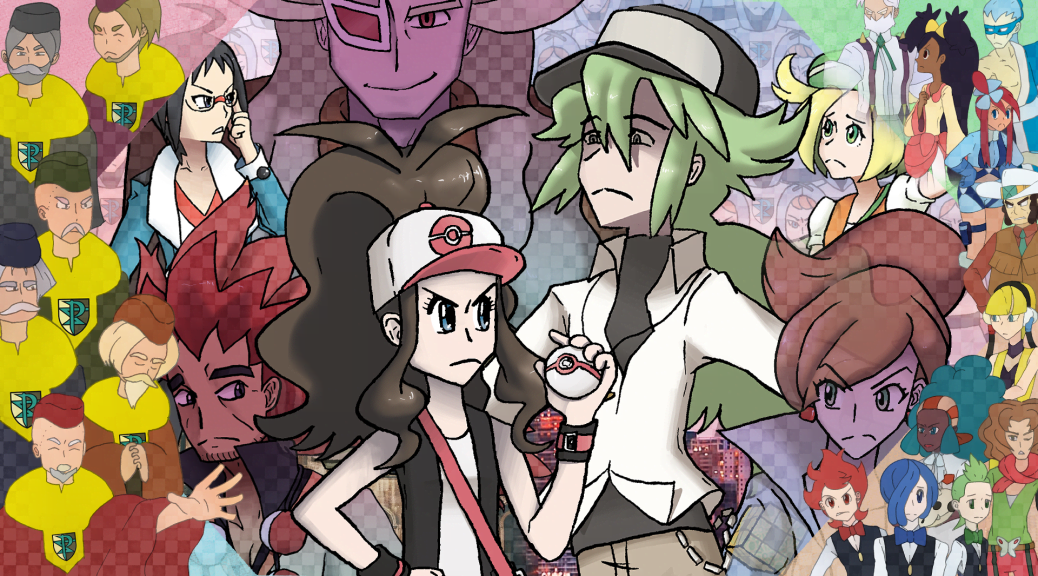Part III: The Cast of Unova
Part III of our tribute to Pokémon Black and White focuses on each of the games’ many characters.
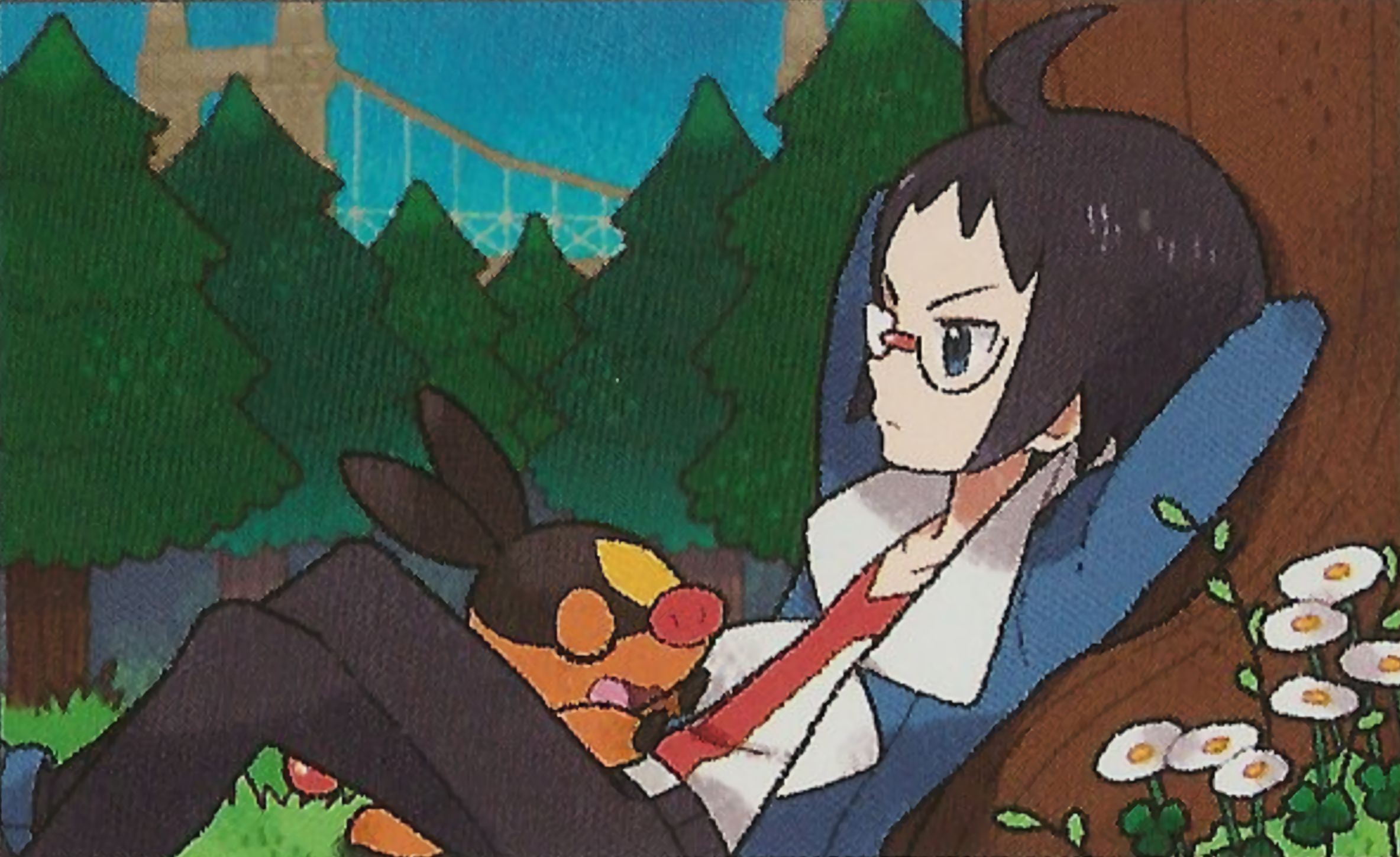
Part III: The Cast of Unova
Hilda and Hilbert | Juniper | Bianca | Cheren | The Gym Leaders | The Elite Four | Alder
Team Plasma Grunts | Concordia and Anthea | The Seven Sages | The Shadow Triad | Ghetsis | N
Cheren
Named after the Ukrainian word for “black,” Cheren’s goals begin as absolute as the blackness he’s named after.1 After his first battle with the player, he focuses not on the strength of the player, but on how he himself can improve. The earliest segment of the game has Cheren touting his knowledge of Pokémon, interrupting Juniper during her lectures and even adding information of his own when she’s done.
“She forgot to say Pokémon jump out at you in the tall grass,” he states matter-of-factly when Juniper is just out of earshot after teaching the group how to catch wild Pokémon. Unlike Bianca, whose Pokémon knowledge and life experiences are limited, Cheren is well-prepared and dead set on his goals.
Cheren’s role as the stronger of your two childhood friends and rivals is also used very cleverly to deliver uninterrupted battle tutorials to the player. For instance, in Striaton City, when the Gym Leaders aren’t yet ready to be challenged, the man blocking the entrance suggests you try the Trainer’s School. But when you go there to check, the only notable person around is Cheren, and he’s certainly not the first Gym Leader! He challenges you to a battle and uses held items, which is only natural for someone so intent on improving his battle skills. This clever encounter teaches newer players about held items without diverting the entire game to offer a standard, time-wasting tutorial. Instead, Cheren’s character continues to focus on improving his battling in a way that smoothly blends into the gameplay.
 This extends long after the tutorials are over, as Cheren’s team continues to grow strategically. It can be easy to miss, but his elemental monkey begins to hold an item to increase its corresponding type’s moves as early as Route 5. It also remains unevolved for another few battles, signifying that Cheren wants it to learn some more attacks before committing to its evolution, after which it will learn no moves by level-up—a traditional “stone evolution” trope. Even Cheren’s design works to convey his intelligence, donning glasses with a bright red bridge to really make them pop. And Cheren’s shirt sports a red stripe that looks like a tie from afar, giving him a professional, mature look.
This extends long after the tutorials are over, as Cheren’s team continues to grow strategically. It can be easy to miss, but his elemental monkey begins to hold an item to increase its corresponding type’s moves as early as Route 5. It also remains unevolved for another few battles, signifying that Cheren wants it to learn some more attacks before committing to its evolution, after which it will learn no moves by level-up—a traditional “stone evolution” trope. Even Cheren’s design works to convey his intelligence, donning glasses with a bright red bridge to really make them pop. And Cheren’s shirt sports a red stripe that looks like a tie from afar, giving him a professional, mature look.
Because he already knows everything necessary to become a strong Pokémon Trainer—at least, he thinks he does—he sits out Juniper’s early tutorials in Accumula Town. Instead, he listens in on Ghetsis’s speech.
After being asked by Ghetsis to consider Pokémon liberation and being confronted by N, Cheren shrugs it off.
“I’m not going to worry about it.” He assures the player that all a Trainer needs to do is “battle Gym Leader after Gym Leader.” That is “the best way for a Trainer to become stronger,” and indeed, that is what the Pokémon series would have you do to complete the game at all. Cheren’s ideals are based on the truths—the preconceived notions—established by the Pokémon universe at large. As Team Plasma continues to wreak havoc, Cheren continues to be dismissive of them, thinking them nothing more than thieves who act too self-righteously for what they do. Despite seeing Pokémon suffer at the hands of cruel people, Cheren still can’t fathom that there is some truth—albeit ironically—to what Team Plasma says, and he doesn’t try to see eye-to-eye with them in any way.
Cheren’s dismissal early on couldn’t be more blatant than in Nacrene City, after Team Plasma steals the Dragon Skull from the museum. After being asked to safeguard the museum while the player, Lenora, and Burgh go after Team Plasma, Cheren mutters to himself: “So I can’t battle the Gym Leader because of Team Plasma, huh… What a bother.” Cheren is more concerned about progressing in his journey to earn all of Unova’s Gym Badges than he is about the theft of the Dragon Skull, partially because he simply doesn’t take Team Plasma—or their ideals—seriously at all. Initially, it seems very easy to side with Cheren. After all, you know Team Plasma is villainous. Even if you can see some sense in their words, you’ll likely not agree with them purely due to their methods. But Cheren is still prioritizing the wrong things in the moment. No matter how blatantly bad Team Plasma is, it doesn’t change the fact that returning the Dragon Skull is of higher priority than battling the Gym Leader. And it won’t be long before that mentality causes Cheren to face disagreement from someone whom all players of Pokémon games have been conditioned to trust at face value.
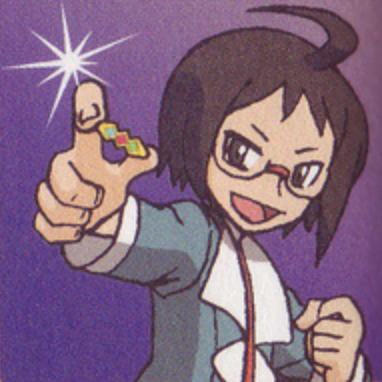 Until that time comes, your journeys continue on. Sometimes you earn the local badge first, while other times Cheren beats you to it. When Cheren claims victory first at Castelia City Gym, he assures you that he’ll “keep winning like this against all of the Unova region’s Gym Leaders[.] Then,” he continues, “I’ll head for the Pokémon League and outperform the Champion! If I do that, everyone will admit what a strong Trainer I am… That will make me feel truly alive…” Here we see that to Cheren, becoming Champion is all he strives for—to the point where he can only really feel “alive” by achieving this goal. Appropriately, you can find a nearby NPC who feels differently about the connection between the Champion and inherent strength, saying that “Being a Pokémon Trainer doesn’t necessarily make someone stronger.” It is, admittedly, not a common mindset in the Pokémon world, but a legitimate point of view all the same.
Until that time comes, your journeys continue on. Sometimes you earn the local badge first, while other times Cheren beats you to it. When Cheren claims victory first at Castelia City Gym, he assures you that he’ll “keep winning like this against all of the Unova region’s Gym Leaders[.] Then,” he continues, “I’ll head for the Pokémon League and outperform the Champion! If I do that, everyone will admit what a strong Trainer I am… That will make me feel truly alive…” Here we see that to Cheren, becoming Champion is all he strives for—to the point where he can only really feel “alive” by achieving this goal. Appropriately, you can find a nearby NPC who feels differently about the connection between the Champion and inherent strength, saying that “Being a Pokémon Trainer doesn’t necessarily make someone stronger.” It is, admittedly, not a common mindset in the Pokémon world, but a legitimate point of view all the same.
Cheren waits for you just outside of Castelia City to receive the Insect Badge. Once it’s in your possession, he challenges you to see who’s stronger. His starter and monkey Pokémon have a type advantage over yours, and he continues to utilize strategic held items rather than brute-force Potions the way Bianca does. His moves also make use of special effects and aren’t all simply damaging moves—but just like Bianca before him, Cheren has no choice but to lose to you.
He’s impressed by your skills but still can’t comprehend why he can’t defeat you. Cheren hypothesizes it’s because of the trust between you and your Pokémon, but it’s not as if Cheren’s lacking in that, either. As evidenced during the battle itself, he feels if he “can bring out the power of [his] Pokémon” he could still emerge victorious, and even after the battle has ended, he places the blame on himself failing to bring out more potential from his Pokémon. He may be stubborn and places more importance on achieving his goals than actively wanting to helping others, but he’s by no means a bad person to other people or to Pokémon.
On Route 5, Cheren challenges you to battle once again. Because Gym Badges are the traditional marker of achievement and, therefore, strength in the Pokémon world, it’s understandable that Cheren times his battles to align with the moment you both have the same badges. By the world’s status quo, this means you should both be on the same footing. But no matter how much his strategy has improved, utilizing new held items and attacks, the player wins.
“Why? Why can’t I beat you?” he asks, unaware of the situation he is living. And his situation is about to get shaken up even further.
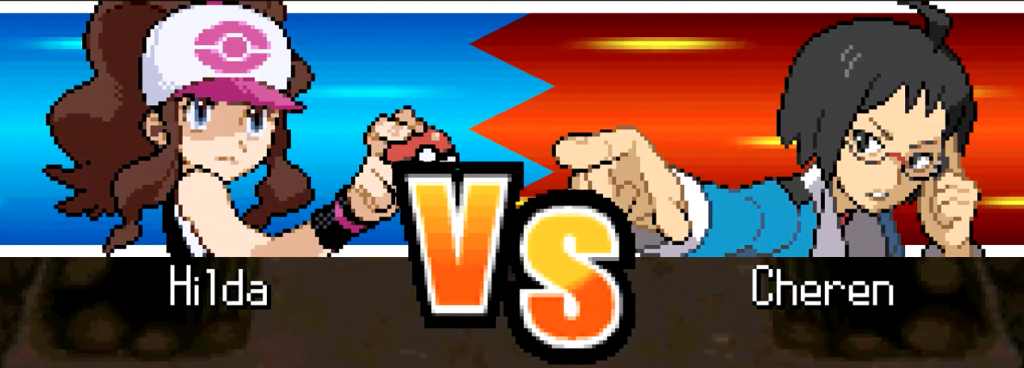
Cheren and the player are introduced to Unova’s Champion, Alder, on Route 5. Alder’s perceived “goofing off” shocks Cheren, whose expectations of the Champion is built upon series tradition. Champions should always be at the Pokémon League unless something cataclysmic is happening—and even then, there’s no guarantee the Champion will get involved. The Champion’s sole role is to be “The strongest Trainer—that’s the Champion,” Cheren believes. Even after Alder explains to him that there are many different people all holding different views, Cheren doesn’t think for a second to change his mentality. He turns away from Alder and mutters to himself, “The Champion is the strongest of the strong! That’s all there is to it.”
But that’s not how the Champion himself feels. “There are many different people and many different answers,” Alder tells Cheren. “When it comes to what a Champion should be, you and I may hold differing views, but so be it! Give it some thought.”
The person whom Cheren wishes to surpass has just gone against everything Cheren once believed, and it’s difficult for him to accept. Bianca’s belief that she must journey to discover herself was encouraged by the Gym Leader Elesa, but Cheren’s steadfast beliefs are instead challenged by the role model whom he would normally be striving to live up to. This revelation haunts Cheren throughout his journey, which is about to shift from a surface-level plot about “becoming a stronger Trainer” to one of true self-discovery.
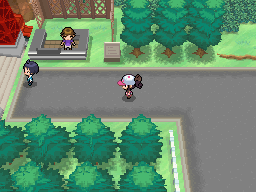
In Driftveil, Gym Leader Clay asks the player and Cheren to help him round up escaped Team Plasma members. Cheren agrees, claiming you both “would have looked for Team Plasma even if [Clay] hadn’t asked.” But he continues, “I can get stronger while beating that bothersome bunch…” Cheren understands that he should do what’s right and stop Team Plasma, but he’s still so shaken by what Alder said that he can’t help but look for an ulterior motive in this situation. Defeating Team Plasma will help him get stronger. By getting stronger, he can someday challenge, defeat, and become the Champion. Cheren’s one-track-mind has nearly blinded him, and he doesn’t see that what he’s doing is already gaining strength for the sake of helping others.
Inside the Cold Storage, Cheren’s impatience, fixation with Alder’s words, and dislike of the cold converge, and he’s far more irritable than ever. “Is there anything more important than strength for Trainers, like the Champion said?” he asks you, this topic on his mind perhaps even more than the primary mission at hand. Once said mission is complete, Cheren once again talks to you one-on-one: “Team Plasma’s ideal… Separating people and Pokémon… It’s exactly the same as not having Pokémon in this world at all.” Cheren then opts to call Team Plasma “a waste of oxygen.”
Even if you don’t agree with Team Plasma, Cheren is needlessly brutal—instead of considering if there’s anything that could be gleaned from Team Plasma’s beliefs, he would rather they just cease to exist. Is that mentality really any better than Team Plasma’s? Should anyone you disagree with never get the chance to speak their mind?
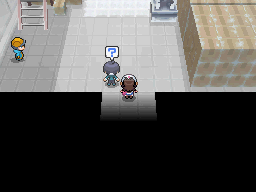
Cheren challenges you to battle just outside Twist Mountain after you both own the Jet Badge. His monkey has finally evolved, and the more obvious held items Cheren uses display his continued growth: he’s moved his starter’s Sitrus Berry to his Liepard and equipped the advanced Leftovers item in its place. And if you notice his Unfezant getting plenty of critical hits, it’s no coincidence—it holds a Scope Lens and has the Super Luck Ability. You’ll certainly win in the end, but these are challenging battles against carefully composed teams. The rare Leftovers on his starter is impossible to miss and blatantly indicates how his strategy has improved, but other items, like the Scope Lens, can go completely unnoticed if you don’t have Frisk or Thief. These kinds of details enhance both the narrative and the gameplay—and although most players won’t even notice them, they’re still included anyway for the games’ benefit, reinforcing just how full of meaning Black and White truly are.
“Your strength… And my strength… Right. Let’s test them,” he says as your Pokémon begin to deliver their blows. Right now, Cheren means this in the way that one of you is stronger than the other, although it’s edging ever closer to meaning that different people have different strengths. But in a world of Pokémon battles—a world that, as N said, has Trainers pitting Pokémon against each other for the sake of competing—comparison is inevitable. When Cheren has been backed into a corner with but a single Pokémon remaining, he wonders aloud: “Can you be strong even if you lose? Is winning everything?” It may seem obvious to the player that no, winning isn’t truly everything, but it’s not as if this mindset hasn’t been encouraged in Pokémon games both past and future. Every game features a rival character who aims to become “strong,” even if they’re more friendly towards the player character. Barry may be silly, but he aims to be strong enough to defeat his father, a Frontier Brain, someday. Hau’s malasada addiction and the smiles he sends your way don’t override his drive to become Champion as a way to step out from his grandfather’s shadow.
Wally is a sickly little boy who can barely travel on his own. He has to exert himself much harder than the average person needs to just to stay three steps behind you. And at the end of it all, he still loses spectacularly against you in Ruby and Sapphire’s Victory Road. Yet despite all this, we live in a world where it isn’t an uncommon fan belief that Sword and Shield’s Hop is the “first rival that players ever felt bad for defeating.”
The idea that rivals must be “strong Trainers” is hardly exclusive to the world of Pokémon—in fact, it has seeped into our own reality. With how frequently rivals are mocked for being “too friendly” or for being “too easy to defeat,” is there really no truth to the notion that strength—that winning—is everything for these characters? Are Cheren’s beliefs really that out of line with the baseline expectations?
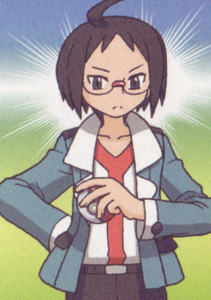 “Pokémon battles are fun,” Cheren admits once he loses. “But what is it to be truly strong?” Perhaps the more important question is, can a Pokémon game really teach us what it means to be “truly strong” when winning battles are how one progresses in the game and subsequently proves they are “right” or “the best?”
“Pokémon battles are fun,” Cheren admits once he loses. “But what is it to be truly strong?” Perhaps the more important question is, can a Pokémon game really teach us what it means to be “truly strong” when winning battles are how one progresses in the game and subsequently proves they are “right” or “the best?”
At the battle’s end, Alder calls out from above: “That was a fine Pokémon battle! I’m happy to see you are both growing as Trainers!” He’s right, of course—comparing Cheren’s battle strategy from prior fights, he has absolutely grown, and so have you. The wind blows through Alder’s hair before he jumps down from the cliff to speak with you both face-to-face.
Cheren, however, is not amused. “If it isn’t the Champion, Alder,” he mocks. “I’m weak, so I lost! …And, honestly, it bothers me when you call it a fine battle despite that.” In this moment Cheren truly becomes the most human of rivals. A competitive tournament battle in the top 4, down to the wire—but you lost. Is there really no pang of disappointment when you’re congratulated on the “fine battle?” Even players who don’t play Pokémon competitively have inevitably had competitive run-ins in life in which they came close to “victory” but still failed. Perhaps you sent in a job application for the position of your dreams. You poured your everything into this application—only to receive the response, “We liked your application, but have chosen to give the job to someone else.” No one would blame you for asking yourself, “Did you really like the application, then—really?”
Alder, exasperated, tells Cheren to take the compliment, then proceeds to ask once again what Cheren plans to do “after becoming strong.”
Cheren hasn’t changed his mind yet and tells Alder what he told you back in Castelia—that becoming Champion “will be the reason for [his] existence.” “I want to prove that I’m really living.”
Alder remarks that Cheren reminds him of someone named Marshal. “Of course, having something you want to become is important,” Alder tells him, admitting that Cheren’s way of thinking isn’t entirely wrong. “But what is even more important,” he adds, “is what you do with your newfound power.”
You both watch him leave, and once he’s completely gone, Cheren for the first time acknowledges that he does not have an answer to Alder’s question. And by admitting this, he shows that he recognizes it is a question worth answering, instead of dismissing it as he has tried so hard to do up until now.
But until he can find his answer, he says, “First, I want to become a strong Trainer so everyone will acknowledge [my] power!” He turns to face you and says bluntly, “Next time, I will win!” Cheren is certainly growing, recognizing other peoples’ viewpoints and trying to come to terms with them in his own way—but he’s still set on his goal through it all. His arc is progressing at a steady, believable pace thanks to this, and even if you know, deep down, that Cheren will not win the next time you meet, you still know he’ll have grown.
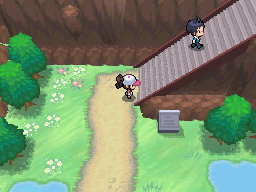
Team Plasma is causing trouble in Twist Mountain, and near the exit Cheren comes across a grunt.
“[Y]ou’re only strong because you Trainers are controlling Pokémon!” the grunt exclaims. It’s obvious, but true—Cheren, and most people of the Pokémon world, feel that becoming Champion or winning many battles makes one “strong.” But who’s really strong in this case—the Trainer, or their Pokémon?
But it seems Cheren has had enough deep existential questioning for one day and instead tells the grunt, “So if you want to set Pokémon free… If that’s what you want, you should start with your own. But taking people’s Pokémon by force is not right. That is not real strength!” We can now see Cheren’s slowly changing perspective as he expresses that it’s important to lead by example. Slowly but surely, Cheren is forming his own opinions on “strength.”
Another grunt enters the scene and tells their comrade that “the thing” they’d been looking for has now been found, and their next destination is “the tower.” As they make their leave, Cheren lets you know that he’ll remain in the cave a bit longer. “I want to think a little bit about what the Champion asked me… What do I want to do with my power after I get strong? And why do I want to be strong in the first place?”
Because Cheren isn’t the player character, forced to pursue strength to complete the game, Cheren can be more reflective about the idea that even in the world of Pokémon, winning battles isn’t everything. Cheren acts as an introspective rival, wondering why winning must be a necessity for members of this character archetype. And because everyone has a different answer to such a question, everyone’s way of reaching that answer is similarly unique. Unlike N, whose relationship with cave imagery aligns with the Platonic—that the cave is a place he has to escape—Cheren’s is more dream-based. The exploration of caves can be compared to exploring one’s subconscious,2 and as such Cheren stays behind to mull over his dilemma in the depths—a dilemma caused by his innermost feelings, his inability to let new ideas into the cave of his mind.
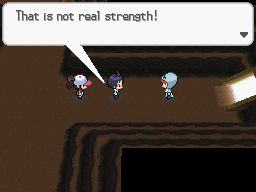
The next Gym is in Icirrus, and upon defeating its leader, Brycen, you’re met by both Cheren and Bianca just outside.
“I’ve been talking with Bianca,” Cheren begins, “and I’m wondering… Since we left Nuvema Town, has something about me…changed? Thinking about what I want to do… Thinking about what I should do… It felt like there was nothing… Have I really become stronger? Or is it just my Pokémon that have? I don’t know anymore!”
Bianca insists Cheren cheer up because it’s great just to get to see everyone together. She tells you she intends to head to the Pokémon Fan Club before attempting to challenge the Gym. “I’m really searching… for what I want to do and what I can do!”
Here you see the way in which your two best friends have grown: Cheren’s wants must find a way to align with his responsibilities, or what he “should” do, whereas Bianca’s wants must find a way to align with what she’s even capable of doing, or what she “can” do. As N said before, Cheren is pursuing the ideal of strength, but needs something to use that strength for, whereas Bianca has faced the truth that not everyone can become stronger. But she can still achieve other goals—she just needs to determine what those goals are. And even if Cheren feels like he hasn’t grown because he hasn’t yet found the answers he seeks, the fact that he doesn’t know does show he has grown—as Cedric said earlier, “That kind of feeling is pure adventure.” Discovering your weaknesses and recognizing the areas in which you are uneducated is part of the multi-step process to growing.
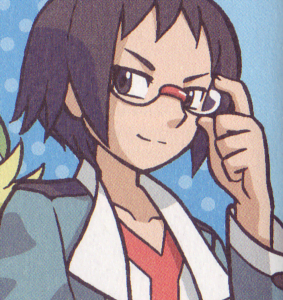
From here, Cheren slowly but surely moves towards his answer, expressing himself by way of both action and dialogue. As your journey takes you into the Dragonspiral Tower after Team Plasma, Cheren for the first time doesn’t consider them “bothersome” for making him wait to battle the Gym Leader. Instead, he works with Brycen to hold the grunts back more out of genuine desire to help than simply for his own benefit.
After the ordeal, Cheren determines that “Being able to do something for Pokémon—for somebody at a time like this—is strength. I’m sure of it. And my strength is something that is given to me by Pokémon.” He’s not only reconsidering what strength is, but where it comes from. By recognizing that strength can come from external sources, Cheren can also reevaluate the meaning and purpose of strength. This is Cheren’s own application of Bianca benefitting from her role models—of how we are all influenced by the people around us, and how they can give us strength.
Your next stop is the Relic Castle, and you beat Cheren to it. He calls you “impressive,” and humbly admits that it took him a while to deal with the wild Pokémon throughout the resort. Such a thing may seem a bit embarrassing—a “strong” Trainer shouldn’t be struggling against wild Pokémon—so Cheren openly admitting this further enforces his changing perspective. “I only made it all the way out here thanks to my Pokémon,” he adds, continuing his previous insight into the value of strength not only being for others, but coming from others. It’s also a clever detail that he appreciates the work his Pokémon put in. Even though they are part of the reason he struggled to breeze through the wild Pokémon, he appreciates their effort all the same, not unlike Alder’s earlier appreciation of the effort Cheren put forth in his battle against you outside the Twist Mountain cave.
Cheren’s adventure of self-discovery begins to pull into the home stretch on Route 10. He challenges you in the way rivals always do, except this time he doesn’t intend to prove he’s stronger than you—he just wants to make sure you’re ready for what lies ahead. Once you prove you’re prepared in the way that this series always has you do—through winning in battle—Cheren isn’t mad, but relieved.
“You are really great,” he says. “And I mean that sincerely.” He’s now no longer driven by victory, but instead by the desire to help others. “Right now, there’s no way I can compete with you,” he tells you—with the fate of people and Pokémon’s relationship on the line, there’s no need to keep things a competition between you and Cheren. Instead, Cheren wants to help you succeed in any way he can.
Despite this natural progression of Cheren into a mature and considerate individual, he does say something a bit surprising: “Since it’s Alder… Since it’s the Champion, I think it will be alright.” Deep down, you and everyone else knows Alder is almost guaranteed to lose to N, but Cheren still has faith in him—in the man whose words made him question his very being, leading to countless “bothersome” feelings and uncertainties. Despite all that, on his journey to discover himself, Cheren has come to respect and accept Alder, and trusts him despite his odds. It is beyond a reasonable doubt that Cheren has changed, and for the better.
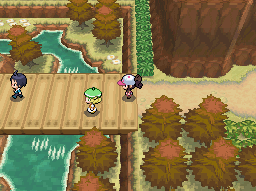
Cheren’s final show of strength comes in the form of him defeating the Elite Four just after you, arriving at the scene of N’s Castle’s ascent. As Alder looks on in shambles, Cheren says unflinchingly, “Tell N this… Some people grow stronger by being with Pokémon. My Pokémon and I are proof. Together, we learned and became stronger.” Through this, Cheren confirms strength is something we gain through helping each other. Just as various Trainers helped Bianca throughout her journey, Cheren has not only come to the conclusion that helping others is a great use of one’s strength, but that his own strength comes from his team of Pokémon—and that his Pokémon got stronger because of Cheren’s abilities and leadership as well. We all learn and grow from our experiences and our encounters with each other, and we also influence the people who inspire us in return.
Cheren may not be a “chosen hero” or the “strongest Trainer in the region” with the credentials to fight N now that his castle has enveloped the Pokémon League. But without his help, you would have been forced to abandon Alder in his time of need, or perhaps even stayed behind with him waiting for someone else to arrive. And thanks to Cheren’s assistance, Alder comes to his senses, and both he and Cheren enter the castle just in time to apprehend Ghetsis once you have defeated him.
By realizing that he should use his strength to help others in their time of need, Cheren was able to work together with Alder to help save the world in which people and Pokémon live together happily.
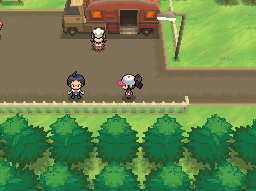
While Bianca returns home—the location where her conflict with her father began—after Team Plasma’s defeat, Cheren returns to Route 5, looping his own adventure back to where his disagreements with Alder all started.
“Strength and strength alone is what matters in this world. So I believed, until I met Alder here,” he says. “But, winning in Pokémon battles isn’t all there is to life. Once I learned that, my eyes were opened to many different things.” Cheren’s admission serves to once again inject worldbuilding into the games. His willingness to accept different perspectives allowed Cheren the opportunity to consider different options that he never thought were even possible, just like the influence from Bianca’s role models proved there were more life options available to her than she initially thought possible. Being a “strong Trainer” isn’t the only possibility for people in the Pokémon world, even if they’re a “rival” character.
“We all have our own band of strength, people and Pokémon both,” Cheren continues. “The strength to make our dreams a reality, the strength to protect what we hold most dear… Why do I think this way now? It’s thanks to you… And Bianca… And Alder… If only N could see this, too, someday.” It is indeed thanks to external influences that Cheren has grown, the same way individuals can improve through connection with others. And just as Cheren has grown to respect Alder, he no longer dismisses N as he once did. Instead, he hopes N can come to share this revelation as well.
“I’m going to take a long, hard look on myself on Victory Road. I’m going to think about what I can do and who I can become…” he says before departing, sounding a lot like Bianca once did when she was unsure of her direction in life. If you make your way to Victory Road after him, you’ll find him training in the cave closest to the League. Here, Cheren admits to you that part of the difficulty of growing is confronting yourself, being forced “to notice things about yourself that aren’t too flattering.” His willingness to admit he wasn’t entirely correct, and sometimes even unkind at points throughout his adventure—both very difficult admissions to make—solidify his maturity.
Alder’s pupil, Marshal, joins in the discussion briefly, reiterating Alder’s teaching that the important thing is improving from battle to battle rather than winning each and every one. Because Cheren has emphasized that leading by example can help put his strength to good use, it’s clever that he continues to have run-ins with mentor-and-pupil figures such as Alder and Marshal. Maybe in the future he can be such a mentor to others—but for now, he’s still unsure. “If I can learn what kind of person I am,” he says finally, “it will open up my path. I’m sure this path will lead me to become the person I’m meant to be.”
In the end, Bianca and Cheren have effectively swapped places: Bianca has decided on what she would like to do next in her life despite starting off lost and confused. Cheren must continue to question himself and learn from experience what he can and should do, despite beginning his journey with a strict, unchanging goal. And the reason why his goal was so unchanging is because he is, when all’s said and done, your rival.
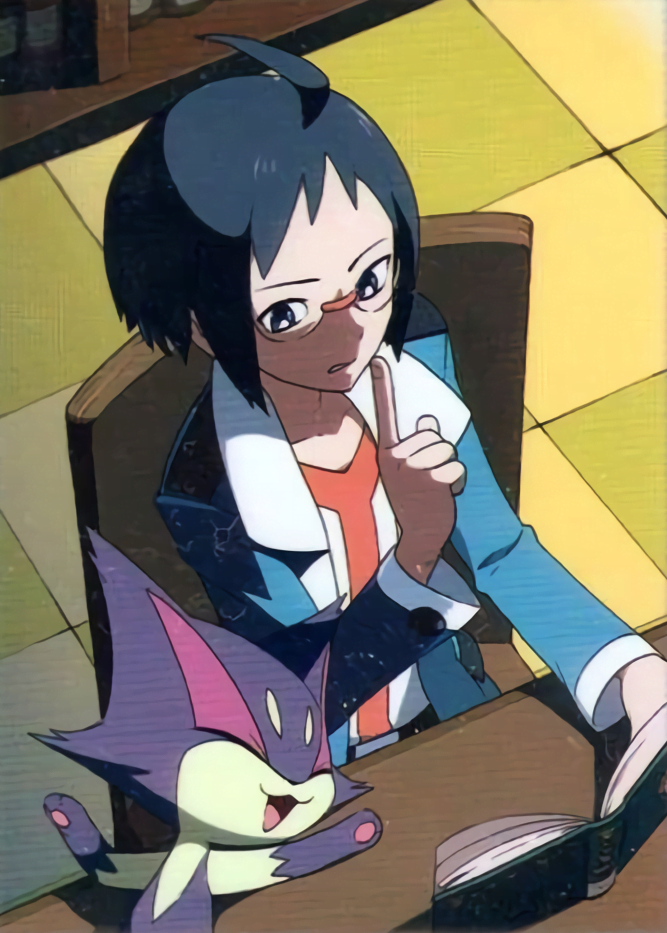 Rivals need a reason to want to battle you so they can fulfill their mechanical role as a semi-frequent boss battle to test your progress. Otherwise, they end up like Brendan or May in Ruby and Sapphire, who only battle you four times total—the fourth time being entirely optional and takes place before you get your seventh badge—then proceed to disappear entirely. Or they end up like your “friends” in X and Y: without goals pertaining specifically to battling, they show up often to interrupt the story, but battle you only rarely. Shauna only battles you twice, as does Trevor—and the first battle with Trevor is a multi battle where he teams up with Tierno. Tierno is the only one who battles you three times because of the multi battle, and the final battle for all three takes place on the same route.
Rivals need a reason to want to battle you so they can fulfill their mechanical role as a semi-frequent boss battle to test your progress. Otherwise, they end up like Brendan or May in Ruby and Sapphire, who only battle you four times total—the fourth time being entirely optional and takes place before you get your seventh badge—then proceed to disappear entirely. Or they end up like your “friends” in X and Y: without goals pertaining specifically to battling, they show up often to interrupt the story, but battle you only rarely. Shauna only battles you twice, as does Trevor—and the first battle with Trevor is a multi battle where he teams up with Tierno. Tierno is the only one who battles you three times because of the multi battle, and the final battle for all three takes place on the same route.
Your actual rival in X and Y, either Calem or Serena, battles you five times, more in-line with a typical rival, and that’s because their goal is, in fact, to become a strong Trainer like their parents. There’s no reason for a character like Trevor, who’s only interested in filling out his Pokédex, to battle you often the way a rival should.
Just like how the player has to want to become the Champion because the game requires it—the credits will only roll once you defeat the Champion and earn the title—the game’s rival has to want to get stronger to justify all the battles they have with you. They don’t necessarily have to want to be a super strong Trainer to want to battle, such as is the case with Bianca, but rivals in those cases understandably have fewer battles with the player. To truly justify being a semi-frequent miniboss, the rival has to have a goal that aligns with yours—in this case, to become the Champion—and when it does, the repeated battles become a way to keep each other “in shape” and always striving to improve. You have to become stronger to stand a chance against the Champion, after all. Even the series’s “weaker” Champions like Diantha and Geeta won’t fall if you haven’t leveled up your team.
But then we reach that tricky impasse: what can you do with a rival character when they have to want to become stronger, but they also have to lose to the player after each battle? How effective can a character like that truly be? You can have up to eight battles against your rival in Red, Green, and Blue, but it doesn’t matter how many times he “smells you later” because you always emerge victorious, even when the title of Champion is on the line.
Cheren claims he wants to become the Champion, and thus, the “strongest Trainer,” so that he can “feel truly alive” because that’s precisely the reason why rivals exist to begin with. But imagine if Cheren had become Champion just as Blue did, only for you to dethrone him moments later. Alder’s words would surely echo in his mind: “What do you plan to do after becoming the Champion?”
To make an effective rival in the confines of the Pokémon series, they have to ask themselves: is becoming stronger enough of a goal by itself?
As an NPC—and a rival at that—Cheren is forced to consider what strength really means. His intelligence serves not only to provide seamless tutorials, but to cleverly establish him as a character indoctrinated by the Pokémon world. Early on, he already knows how to battle, catch Pokémon, and even make use of held items—and he knows that becoming “the very best” is the main goal of any Pokémon Trainer. As games that are, at their core, about Pokémon as a series, Black and White’s rival Cheren uses the core justification for the typical rival’s existence as the basis of his own character arc. With it, he conveys a story about how important it is to be both introspective and receptive to outside influences in order to understand why it is you do the things you do.
Unlike the white of Bianca, which is made for influencing, like a white piece of paper ready to be written or drawn upon, it’s much harder to find a way to write on Cheren’s black—to influence his absolute, firmly-held beliefs reminiscent of how black “is complete and unchanging.”3 And unlike white, black is, scientifically speaking, created when all color wavelengths are absorbed by an object. Cheren does not reflect those around him—he denies Alder and N’s points of view entirely, initially believing only his point of view is correct. But just like how Bianca learns to narrow her focus on her own, Cheren must learn to be more receptive to the perspectives of others. He does this through accepting that strength can come from external forces—not only through the collaboration between people and Pokémon, but through accepting different perspectives.
The ability to learn from each other and continue improving not only provides Cheren with a more realistic end goal as a character—because he’s not the player, so he can’t possibly be “the best Trainer”—but also reflects the way our own life “journey” never really comes to an end. In the world of Pokémon, if your goal is to “become the Champion,” once you’re there, that’s it. If instead you aim to surpass yourself, you’ll always have something to strive for. And by being receptive to others, you welcome the opportunity to further grow as you learn new things—and you may be able to teach others new things in the process.
If you replace “strength” with “getting better at any given skill,” Cheren’s plight reveals its deeper meaning. Goals aren’t just about “getting stronger” or “getting better.” Why do you want to be better at the thing you like? How will that affect you—and how will it affect the people around you? Goals require an understanding of both yourself and the wider world. The question we should ask ourselves is not just “what is strength?” We should ask why do you want to be stronger? And what is that strength good for? Why does that strength matter to you, and why does it matter to the world? These are the questions that help us improve not only ourselves, but the world that hosts us—and since it’s the world that helps shape who we are, why not give a little back?
